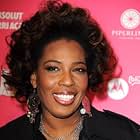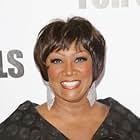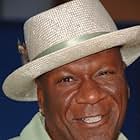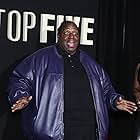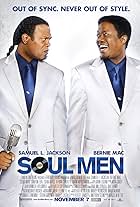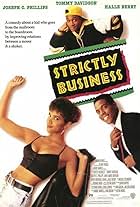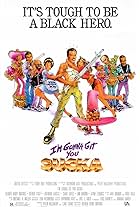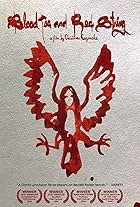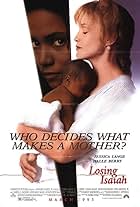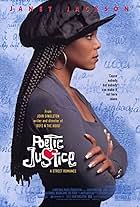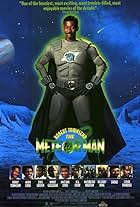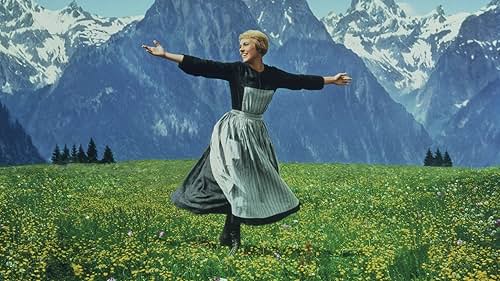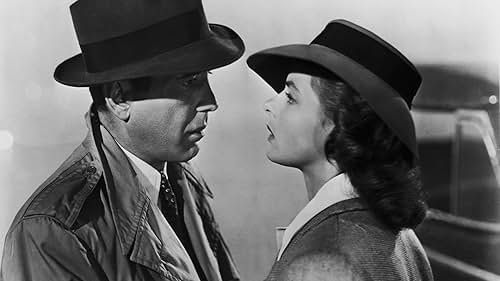At a sexy, sizzling nightclub, pianist Percival lives life by the rules, while Rooster, the club's flashy lead performer, struts his stuff on the stage. But all changes when greed, fame and ... Read allAt a sexy, sizzling nightclub, pianist Percival lives life by the rules, while Rooster, the club's flashy lead performer, struts his stuff on the stage. But all changes when greed, fame and murder threaten to destroy them and the joint.At a sexy, sizzling nightclub, pianist Percival lives life by the rules, while Rooster, the club's flashy lead performer, struts his stuff on the stage. But all changes when greed, fame and murder threaten to destroy them and the joint.
- Awards
- 7 nominations total
André 3000
- Percival Jenkins
- (as André Benjamin)
- Director
- Writer
- All cast & crew
- Production, box office & more at IMDbPro
Featured reviews
I saw the movie last night.
It opens beautifully. Young rooster is especially engaging and we get a sense of Percival's young life. Once we move into adulthood, the music video techniques and songs unfavorable to the story dominate. A lot of the story is there, but either because of editing or the choice of camera over story points makes the story less engaging then it could've been. It is clear that most of the actors can act, but it seems that their performances were underserved. In the end it feels like a series of music videos. Unfortunately, it is devoid of the emotion that I imagine was intended. Too, too bad...because it had such great potential.
It opens beautifully. Young rooster is especially engaging and we get a sense of Percival's young life. Once we move into adulthood, the music video techniques and songs unfavorable to the story dominate. A lot of the story is there, but either because of editing or the choice of camera over story points makes the story less engaging then it could've been. It is clear that most of the actors can act, but it seems that their performances were underserved. In the end it feels like a series of music videos. Unfortunately, it is devoid of the emotion that I imagine was intended. Too, too bad...because it had such great potential.
It is a highly stylized slice of life. As usual, reading through the comments left here, I'm finding that many just can't leave their pretense at the door. It would seem that any film with an all African-American cast set in the American south is required to beat us over the head with an idea we are all (I would hope) aware of. ie; Jim Crow sucked. Instead, this film simply portrays people with hopes and dreams, faults and virtues, capable of love and hate, good and evil. in other words, people. Not "black people". That was refreshing. (and, IMHO, a far stronger statement than one could ever make through heavy-handed symbolism) Is the film perfect? Far from it. The plot is in many ways pedestrian. The film telegraphs plot twists rather than foreshadowing them. However, are there flashes of brilliance? Good Lord yes. These are two astonishingly talented men (Andre and Big Boi) and simply as a showcase for that talent, this film succeeds. If you just sit down and let the film wash over you, you will enjoy. If you over-think, and ask it to be something it isn't, you won't. It's that simple.
Here we have the most creative Hip Hop/Rap duo teaming with one of the most creative music video directors on a very good film. I can't believe people aren't seeing this movie...especially black folks. We support some of the most drab and unimaginative crap in music and film but won't support good art. (Maybe it needs more violence or ass shaking in it.)
Anyways, Idlewild has a great story, great music, and highly creative camera work and directing. The acting isn't excellent, but it does not detract from the film. I look forward to seeing more work from Mr. Barber. I wish there were more black filmmakers like him and more music artists like Outkast. Let's move forward people.
Anyways, Idlewild has a great story, great music, and highly creative camera work and directing. The acting isn't excellent, but it does not detract from the film. I look forward to seeing more work from Mr. Barber. I wish there were more black filmmakers like him and more music artists like Outkast. Let's move forward people.
I am guilty of elitism. I miss the days when Outkast's music was an obscurity. When their music was my music and not everybody's. When I finally did meet someone who knew the hook to "Elevators", we were instant best friends. But alas, Outkast gave up their dark, celestial style for ubiquitous jubilation.
While I'm willing to give up smoking for another ATliens or Aquemini,I can still appreciate the festivity that now ensues when they pop up on the radio. I'm sure Andre 3000 and Big Boi, err... Andre Benjamin and Antwan A. Patton, appreciate it even more. After all, the new vaudeville-bass quirks that they adopted have transformed them into one of the most adored groups today. It also garnered them this opulent production with HBO films.
Andre is Percival, a wholesome son of a mortician with dreams of making the Harlem music scene. Until then he plays piano before a ruthless crowd in Church. Church is hardly that, it is a Speakeasy with wild music and chichi showgirls.
Percival's best friend since childhood is Rooster (Antwan), a suave player from a family of gangsters. When his uncle is gunned down by the shifty eyed Terrence Howard, he inherits Church and it's debt with bootleggers. To get out of the red, he relies on his star performer Angel Davenport, played by the stunning Paula Patton. Angel and Percival develop the love jones.
There are tons of other catalyst characters. So many that it takes the humble narrator (Percival) ten minutes to introduce them all.
The town Idlewild is a place where Caucasians and subtlety do not exist. The only practicing minimalist is Percival and he is viewed as a recluse. He doesn't get talkative until he is alone with a cadaver.
Idlewild is visually titillating and toe-tapping fun, but a very simple story with elaborate storytelling. A period piece with CGI dance numbers, singing cuckoo clocks, and a talking flask. The music doesn't so much forward the story as tease it. When Rooster raps in Church, he paves the way for a Soul Train spectacle.
Bryan Barber acquired the director's chair through a strong relationship with Outkast. He is the man behind their most popular music videos. While he has an eye for pageantry, his script is too thin and unconstrained. For example, the narrator tells us that Rooster and Percival are best friends, but once we transcend their childhood prologue and reach adulthood, there are three instances of interaction. Once in the middle and twice at the end. I got the sense of two separate stories interconnected through habitat instead of plot points.
In so many ways this film is a metaphor for the current state of Outkast's career. While a movie based on the "old" Outkast would probably be a ghetto story in outer space, this one borders on nostalgia and women. Like their solo careers, Andre's character is always artistic and progressive. Big Boi's character arch is so small you could hop over it.
In the last two years there have been intermittent rumors of Outkast's breakup. Since they did not collaborate on their last album, nor the soundtrack to this film, they are together only in plastic packaging. Idlewild does nothing to squash these rumors.
Either way, there's not much I can do but throw my hands up in hey-ya, and rejoice in their gaiety like the rest of the world.
While I'm willing to give up smoking for another ATliens or Aquemini,I can still appreciate the festivity that now ensues when they pop up on the radio. I'm sure Andre 3000 and Big Boi, err... Andre Benjamin and Antwan A. Patton, appreciate it even more. After all, the new vaudeville-bass quirks that they adopted have transformed them into one of the most adored groups today. It also garnered them this opulent production with HBO films.
Andre is Percival, a wholesome son of a mortician with dreams of making the Harlem music scene. Until then he plays piano before a ruthless crowd in Church. Church is hardly that, it is a Speakeasy with wild music and chichi showgirls.
Percival's best friend since childhood is Rooster (Antwan), a suave player from a family of gangsters. When his uncle is gunned down by the shifty eyed Terrence Howard, he inherits Church and it's debt with bootleggers. To get out of the red, he relies on his star performer Angel Davenport, played by the stunning Paula Patton. Angel and Percival develop the love jones.
There are tons of other catalyst characters. So many that it takes the humble narrator (Percival) ten minutes to introduce them all.
The town Idlewild is a place where Caucasians and subtlety do not exist. The only practicing minimalist is Percival and he is viewed as a recluse. He doesn't get talkative until he is alone with a cadaver.
Idlewild is visually titillating and toe-tapping fun, but a very simple story with elaborate storytelling. A period piece with CGI dance numbers, singing cuckoo clocks, and a talking flask. The music doesn't so much forward the story as tease it. When Rooster raps in Church, he paves the way for a Soul Train spectacle.
Bryan Barber acquired the director's chair through a strong relationship with Outkast. He is the man behind their most popular music videos. While he has an eye for pageantry, his script is too thin and unconstrained. For example, the narrator tells us that Rooster and Percival are best friends, but once we transcend their childhood prologue and reach adulthood, there are three instances of interaction. Once in the middle and twice at the end. I got the sense of two separate stories interconnected through habitat instead of plot points.
In so many ways this film is a metaphor for the current state of Outkast's career. While a movie based on the "old" Outkast would probably be a ghetto story in outer space, this one borders on nostalgia and women. Like their solo careers, Andre's character is always artistic and progressive. Big Boi's character arch is so small you could hop over it.
In the last two years there have been intermittent rumors of Outkast's breakup. Since they did not collaborate on their last album, nor the soundtrack to this film, they are together only in plastic packaging. Idlewild does nothing to squash these rumors.
Either way, there's not much I can do but throw my hands up in hey-ya, and rejoice in their gaiety like the rest of the world.
We think this movie was just great fun. It is a bit chopped up, but that's a minor problem. Choreography is tight and excellent; music is deleriously hip. Casting and acting was a big plus - stellar performances all around. Cecily Tyson is such a master - adds richness to even the smallest role. Don't agree that we'll see award nominations here though. Directing could have been much much better. The Director failed this exceptional cast - but we're happy that the film was made. We felt like the screenplay could have been written for this cast, and the juxtaposition of rap music over 1930's rhythm worked in a crisp and welcome way. We never tire of those old cars, clothes and styles, but we're grateful for all of this "new" talent and exceptional music. WELL worth the time!
Did you know
- GoofsPercival states that he has been collecting records since the age of 8. For that to be possible, he would have to be 13 years old at the most, as the first record player was invented in 1930, 5 years before the movie takes place.
- Crazy creditsThe credits play over a musical dance number by Percival
- ConnectionsEdited into Destination Planet Rock (2007)
- SoundtracksThe Nightmare
Written by Al Handler, Len Riley and Billy Meyves
Performed by Cab Calloway & His Orchestra
Courtesy of JSP Records
- How long is Idlewild?Powered by Alexa
Details
- Release date
- Country of origin
- Language
- Also known as
- My Life in Idlewild
- Filming locations
- Orton Plantation - 9149 Orton Road SE, Winnabow, North Carolina, USA(interior and exterior of Jenkins Mortuary; interior of piano room)
- Production companies
- See more company credits at IMDbPro
Box office
- Budget
- $15,000,000 (estimated)
- Gross US & Canada
- $12,571,185
- Opening weekend US & Canada
- $5,745,780
- Aug 27, 2006
- Gross worldwide
- $12,643,027
- Runtime
- 2h 1m(121 min)
- Color
- Sound mix
- Aspect ratio
- 2.39 : 1
Contribute to this page
Suggest an edit or add missing content






















